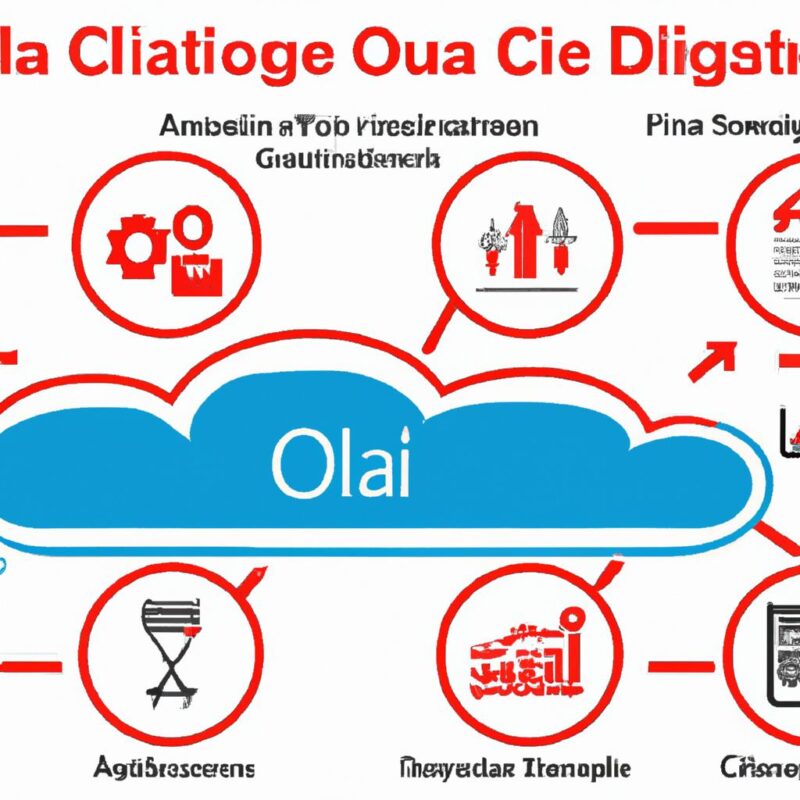Cloud
Oracle Cloud Infrastructure Data Catalog: The Ultimate Solution for Data Management
[ad_1]
As a business owner or manager, you understand the importance of data management in driving business growth and success. However, with the vast amount of data generated every day, managing and organizing it can be a daunting task. This is where oracle cloud infrastructure data catalog comes in.
Oracle Cloud Infrastructure Data Catalog is a comprehensive data management tool that helps businesses organize, manage, and analyze their data effectively. With features such as metadata management, data discovery, and collaboration, it offers a complete solution to all your data management needs.
In this article, we will explore the benefits of using Oracle Cloud Infrastructure Data Catalog, how to use it, and real-world examples of businesses that have achieved success through its implementation. So, let’s dive in and discover how Oracle Cloud Infrastructure Data Catalog can transform your data management processes.
What is Oracle Cloud Infrastructure Data Catalog?

Definition of Data Catalog and its Benefits
A data catalog is an organized inventory of data assets that provides a clear understanding of the data available within an organization. It is essentially a roadmap that helps businesses identify, locate, and utilize their data more effectively.
Oracle Cloud Infrastructure Data Catalog takes data cataloging to a whole new level. With its advanced metadata management features, it enables businesses to streamline their data discovery and analysis processes, resulting in improved accuracy and efficiency.
Features of Oracle Cloud Infrastructure Data Catalog
Oracle Cloud Infrastructure Data Catalog offers a wide range of features that make it a comprehensive data management tool. Some of its key features include:
-
Metadata Management: With its automated metadata management capabilities, Oracle Cloud Infrastructure Data Catalog can extract metadata from different sources and consolidate it into a single, easy-to-access platform.
-
Data Discovery: The tool provides a powerful search engine that allows businesses to quickly and easily find the data they need. It also offers data profiling and data lineage capabilities that help businesses understand the context and history of their data.
-
Collaboration: Oracle Cloud Infrastructure Data Catalog enables teams to collaborate more effectively by allowing them to share and annotate data assets.
-
Security: With its robust security features, Oracle Cloud Infrastructure Data Catalog ensures that sensitive data is protected at all times.
Comparison with Other Data Catalog Tools
While there are several data catalog tools available in the market, Oracle Cloud Infrastructure Data Catalog stands out due to its advanced features and capabilities. It offers a comprehensive solution that covers all aspects of data management, from metadata management to data discovery, collaboration, and security. With its user-friendly interface and automation capabilities, it enables businesses to manage their data more efficiently and effectively than ever before.
How to Use Oracle Cloud Infrastructure Data Catalog?
Step-by-Step Guide on Setting Up and Using the Tool
Setting up and using Oracle Cloud Infrastructure Data Catalog is a simple process that involves a few easy steps. First, you need to create an account and sign in to the console. Once you are logged in, follow these steps:
-
Create a data asset: To create a data asset, you need to provide information such as the asset name, description, and type. You also need to specify the source of the data and its format.
-
Add metadata: After creating the asset, you can add metadata to it. Metadata helps in organizing and managing data. You can add information such as the data owner, data quality, and data lineage.
-
Discover data: Once you have added metadata to your data asset, you can use the discovery feature to search for relevant data. The discovery feature uses machine learning algorithms to make data discovery faster and more accurate.
Best Practices for Data Organization and Management
Proper data organization and management are crucial for effective data management. Here are some best practices to follow when using Oracle Cloud Infrastructure Data Catalog:
-
Use standard naming conventions: Standard naming conventions help in organizing and identifying data assets easily.
-
Create a data dictionary: A data dictionary is a centralized repository of metadata that helps in managing and organizing data assets.
-
Use tags and labels: Tags and labels help in categorizing data assets and make it easier to search for them.
Tips for Optimizing Data Discovery and Analysis
Optimizing data discovery and analysis is essential for extracting maximum value from your data. Here are some tips to help you optimize your data discovery and analysis processes:
-
Use filters: Filters help in narrowing down search results and finding relevant data quickly.
-
Use data lineage: Data lineage helps in understanding the relationships between different data assets and their origins.
-
Use data profiling: Data profiling helps in understanding the structure and quality of your data, making it easier to analyze and visualize.
Benefits of Using Oracle Cloud Infrastructure Data Catalog
If you are considering implementing Oracle Cloud Infrastructure Data Catalog in your business, you may wonder about the benefits it offers. Here are some of the key benefits that Oracle Cloud Infrastructure Data Catalog can provide:
Improved Data Quality and Accuracy
Oracle Cloud Infrastructure Data Catalog enables you to maintain a centralized data repository where you can store all your data assets. This ensures that the data is accurate, up-to-date, and consistent across the organization. With its advanced metadata management capabilities, you can also track data lineage, data quality, and data usage, ensuring that your data is trustworthy.
Increased Productivity and Efficiency
Oracle Cloud Infrastructure Data Catalog makes it easy to find, share, and collaborate on data assets across the organization. This reduces the time and effort required to locate and access data, allowing your employees to be more productive and efficient. With its automated data discovery and tagging capabilities, you can also reduce the time and effort required to catalog and manage your data.
Enhanced Collaboration and Knowledge Sharing
Oracle Cloud Infrastructure Data Catalog enables you to share data assets with other teams and stakeholders across the organization. This promotes collaboration and knowledge sharing, enabling your employees to make better decisions and achieve better outcomes. With its advanced search capabilities, you can also find relevant data assets quickly and easily, improving the speed and accuracy of decision-making.
Reduced Costs and Risks
Oracle Cloud Infrastructure Data Catalog helps you to reduce costs and risks associated with data management. With its advanced metadata management and data governance capabilities, you can ensure that your data is compliant with relevant regulations and policies. This reduces the risk of data breaches and other data-related issues. Additionally, by automating data discovery and tagging, you can reduce the time and effort required to manage your data, saving costs and freeing up resources for more strategic initiatives.
In summary, Oracle Cloud Infrastructure Data Catalog offers a range of benefits that can transform your data management processes. By improving data quality and accuracy, increasing productivity and efficiency, enhancing collaboration and knowledge sharing, and reducing costs and risks, it can enable your organization to make better decisions and achieve better outcomes.
Case Studies and Success Stories
Real-World Examples of Businesses Using Oracle Cloud Infrastructure Data Catalog
Many businesses across various industries have implemented Oracle Cloud Infrastructure Data Catalog to manage their data effectively. Let’s take a look at some real-world examples of businesses that have achieved success through its implementation.
Example 1: A Financial Services Company
A financial services company was struggling to manage its vast amount of data, which was stored in various formats across different systems. They implemented Oracle Cloud Infrastructure Data Catalog to streamline their data management processes. With the tool’s metadata management and data discovery features, they were able to organize their data effectively, reducing the time and effort required for data analysis.
Example 2: A Retail Company
A retail company needed to analyze their sales data to identify trends and patterns to improve their business operations. They implemented Oracle Cloud Infrastructure Data Catalog to manage their data, making it easier to analyze and gain insights. With the tool’s collaboration features, their teams were able to work together more effectively, resulting in improved decision-making and increased productivity.
Results and Benefits Achieved by These Businesses
The businesses that implemented Oracle Cloud Infrastructure Data Catalog achieved impressive results and benefits, including:
- Improved data quality and accuracy
- Increased productivity and efficiency
- Enhanced collaboration and knowledge sharing
- Reduced costs and risks
The financial services company was able to reduce their time for data analysis by 50%, while the retail company saw a 25% increase in productivity. Both businesses also reported improved decision-making and better insights into their data.
Insights and Lessons Learned from Their Experiences
Implementing Oracle Cloud Infrastructure Data Catalog requires planning, commitment, and collaboration. The businesses that achieved success through its implementation shared some insights and lessons learned, including:
- Define clear goals and objectives for data management
- Involve all stakeholders in the process, including IT and business teams
- Develop a data governance framework to ensure data quality and consistency
- Invest in training and education for users to ensure they have the skills and knowledge to use the tool effectively
By following these insights and lessons learned, businesses can achieve success in their data management processes through the implementation of Oracle Cloud Infrastructure Data Catalog.
Conclusion
In conclusion, Oracle Cloud Infrastructure Data Catalog is an essential tool for businesses that want to streamline their data management processes. With its advanced features and capabilities, it offers a complete solution to all your data management needs, from metadata management to data discovery and collaboration.
By implementing Oracle Cloud Infrastructure Data Catalog, businesses can improve data quality, increase productivity, enhance collaboration, and reduce costs and risks. Real-world examples have shown that businesses that have implemented Oracle Cloud Infrastructure Data Catalog have achieved significant success and growth.
In today’s data-driven world, effective data management is crucial to business success. Oracle Cloud Infrastructure Data Catalog offers a simple and comprehensive solution to all your data management needs. So, why wait? Implement Oracle Cloud Infrastructure Data Catalog today and take your business to the next level!




